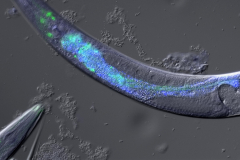The abundance of available methods and the ease of handling make C. elegans an exceptional model organism for a wide range of studies and theses, including internships, B.Sc. theses, and M.Sc. theses.
These projects typically contribute to larger ongoing research efforts within the lab. Currently, our work focuses on two key areas: the stress response in C. elegans and RNA biology, specifically RNP complexes and their role in sRF biogenesis.
A significant emphasis of our research lies in membrane dynamics—an essential component of cellular processes, such as vesicle creation, release, and reuptake. These include critical mechanisms like synaptic vesicle cycling and neurotransmitter release, endocytosis, phagocytosis, intracellular sorting, autophagy, and mitochondrial dynamics. These processes are pivotal not only for normal cellular function but also for understanding the development of diseases such as cancer and neurodegenerative disorders.
In the context of stress responses, our studies delve into how C. elegans reacts to various environmental and cellular stresses, including heat shock, cold stress, and endoplasmic reticulum (ER) stress. By examining how these stressors influence cellular integrity, protein homeostasis, and membrane remodeling, we aim to shed light on fundamental pathways that underlie resilience and vulnerability to stress.
This integrative approach provides valuable insights into the mechanisms of disease progression and cellular adaptation, making C. elegans an invaluable model for cutting-edge biological research.
All our C. elegans projects deal with genes/mechanisms that are conserved in humans. This is true for the genes involved in insulin/IGF- as well as mTOR-signalling, SGK-1 (serum-and-glucocorticoid-inducible kinase 1), PINK-1, Parkin, and LRRK2.
Common techniques that can be learned and used in the course of a 1- to 6-month internship are for example:
• CRISPR/Cas9 to manipulate the genome of an organism (introduction of disease-relevant relevant mutations, gene deletions, reporter-gene constructs)
• analyses of reporter-genes in novel genes of interest
• genetic crossing experiments (classical mendel-genetics), to test the interactions of mutations in different genes (suppression, enhancement)
• analyses of signalling pathways
• Transcriptomics
• functional testing of human genes/gene variants in C. elegans (genetical rescue experiments)
• pharmacological impact on gene functions
• influence of stress and environmental factors (e.g. food) on signalling pathways and behavioural output
• lifespan analyses
• biochemical characterization of protein variants
• protein interactions
• mass spectrometry analyses of protein modifications and protein dynamics
• RNA-interference screens (genome wide or targeting families of genes/proteins)
• cell-biological characterizations
• imaging (of gene expression, cell dynamics, developmental processes).
• mutant screens incl. bioinformatic analyses (mapping of mutations)
If You are interested, please contact: angelika.reichinger@biologie.uni-freiburg.de

